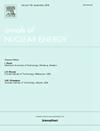使用SANDY的ARIANE GU3燃耗模型中的核数据不确定性传播:FA和小锥模型的比较
IF 1.9
3区 工程技术
Q1 NUCLEAR SCIENCE & TECHNOLOGY
引用次数: 0
摘要
核数据不确定度取自通用评估文库JEFF-3.3、ENDF/B-VIII。0和JENDL-4.0u使用SANDY随机抽样码结合Monte Carlo燃耗码serent -2通过ARIANE GU3样本的耗尽模型进行传播。这种方法能够准确地描述许多核素浓度的不确定度,这些不确定度存在于辐照后实验中。蒙特卡罗燃耗计算中不确定性传播的随机抽样方法是出了名的计算昂贵。为了解决这个问题,使用基于条件估计器的方法独立于蒙特卡罗不确定性评估了核数据不确定性对模型响应的贡献。有趣的是,与最佳估计值不同,发现不确定性估计值与模型简化相当独立。通过比较GU3燃料组件模型和简化的针筒模型的不确定性结果,证明了这一点。在这些模型之间调换不确定度的可能性表明,不确定度分析并不严格需要高测定数据准确性。最后,方差分解分析揭示了主要核数据库不确定性数据集的差距,导致燃耗计算中总不确定性的低估。本文章由计算机程序翻译,如有差异,请以英文原文为准。
Nuclear data uncertainty propagation in the ARIANE GU3 burnup model using SANDY: Comparison between a FA and a pincell model
Nuclear data uncertainties taken from the general-purpose evaluated libraries JEFF-3.3, ENDF/B-VIII.0 and JENDL-4.0u are propagated through a depletion model of the ARIANE GU3 sample using the SANDY stochastic sampling code combined with the Monte Carlo burnup code SERPENT-2. This approach enabled an accurate characterization of the uncertainty in many nuclide concentrations, for which measurements exist from post-irradiation experiments.
Stochastic sampling methods for uncertainty propagation in Monte Carlo burnup calculations are notoriously computationally expensive. To address this, the contribution of nuclear data uncertainties to the model response was assessed independently of Monte Carlo uncertainties using a methodology based on conditional estimators. Interestingly, unlike best-estimate values, uncertainty estimates were found to be rather independent of model simplifications. This was demonstrated by comparing uncertainty results for the GU3 fuel assembly model and for a simplified pincell model. The possibility to transpose uncertainties between such models suggests that high assay data accuracy is not strictly necessary for uncertainty analyses. Finally, the variance decomposition analysis revealed gaps in the uncertainty datasets of major nuclear data libraries, leading to an underestimation of total uncertainties in burnup calculations.
求助全文
通过发布文献求助,成功后即可免费获取论文全文。
去求助
来源期刊

Annals of Nuclear Energy
工程技术-核科学技术
CiteScore
4.30
自引率
21.10%
发文量
632
审稿时长
7.3 months
期刊介绍:
Annals of Nuclear Energy provides an international medium for the communication of original research, ideas and developments in all areas of the field of nuclear energy science and technology. Its scope embraces nuclear fuel reserves, fuel cycles and cost, materials, processing, system and component technology (fission only), design and optimization, direct conversion of nuclear energy sources, environmental control, reactor physics, heat transfer and fluid dynamics, structural analysis, fuel management, future developments, nuclear fuel and safety, nuclear aerosol, neutron physics, computer technology (both software and hardware), risk assessment, radioactive waste disposal and reactor thermal hydraulics. Papers submitted to Annals need to demonstrate a clear link to nuclear power generation/nuclear engineering. Papers which deal with pure nuclear physics, pure health physics, imaging, or attenuation and shielding properties of concretes and various geological materials are not within the scope of the journal. Also, papers that deal with policy or economics are not within the scope of the journal.
 求助内容:
求助内容: 应助结果提醒方式:
应助结果提醒方式:


